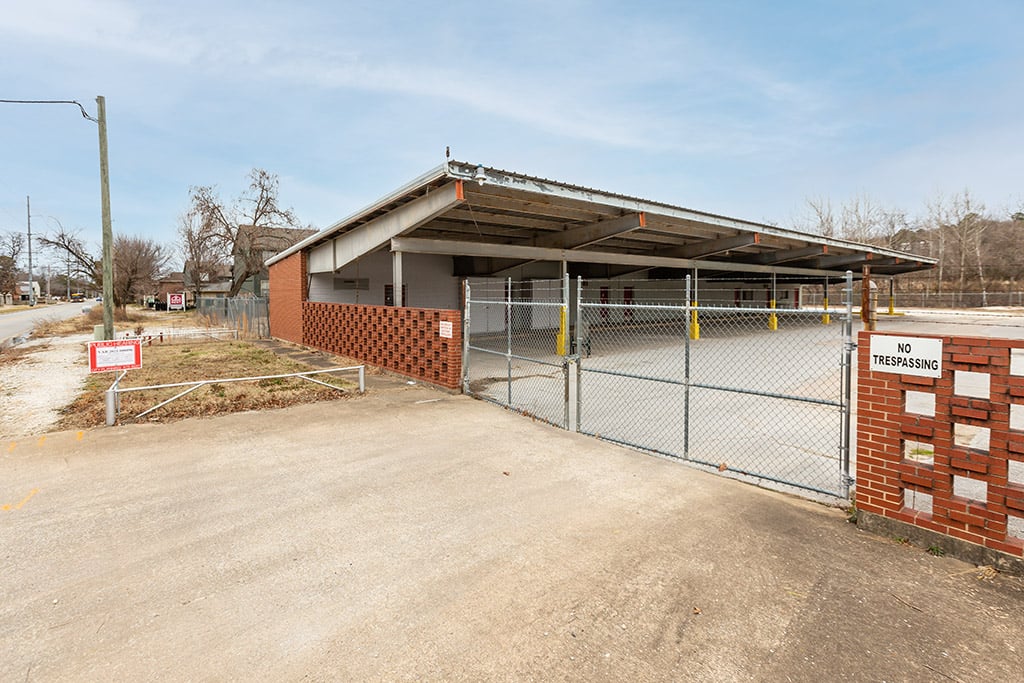
1332 N. Leverett Ave. / Photo: Todd Gill, Fayetteville Flyer
FAYETTEVILLE — Plans for a new outdoor restaurant on Leverett Avenue got the first green light.
The Planning Commission on Monday approved a variance to the city’s flood damage prevention code which allows the owners of Feed and Folly to move forward an outdoor eating establishment at 1332 N. Leverett Ave., just north of the intersection of West Holly Street.
The 1.3-acre gated property is zoned I-1, Heavy Commercial and Light Industrial. It has in the past been used for work vehicle storage, and includes several covered parking areas, along with two accessory structures.
Lewis Chase who co-owns the property and the Feed and Folly restaurant on South College Avenue with partners Michael and Matt Sutton, said the concept will be separate from Feed and Folly.
He said the hope is to provide some sort of access to Scull Creek Trail, which runs along the eastern side of the property next to Scull Creek.
“We are really big fans of the bike trail and want to add to places to stop for a pit stop along the way from downtown to north Fayetteville,” Chase said.
The partners want to add a new building for food and beverage service, but needed approval from the commission.
The nearby creek has an associated floodplain, according to FEMA’s flood insurance rate map.
City flood-proofing code typically requires new structures in flood zones to be built up to three feet above the base flood elevation, but the partners said meeting Americans with Disabilities Act (ADA) requirements simply aren’t practical at that height on the property.
The proposed solution is to instead use a modified shipping container for food service that can be readily flood-proofed up to the service window, thereby allowing a finish floor elevation that can provide ADA access with a ramp.
City staff recommended approval of the request and said the one-foot flood-proofing plan would still meet FEMA’s minimum regulatory requirements, and that a shipping container already lends itself to flood-proofing which would limit flood losses.
Alan Pugh, a staff engineer with the city, said the city’s three-foot requirement is based on insurance standards.
“Insurance is much more affordable if you flood-proof to three feet above the base flood elevation,” said Pugh during the commission’s agenda-setting session on Thursday. “The applicant is well-aware of that and they’ve chosen…to accept those challenges.”
Commissioner Porter Winston asked whether there’s a danger of a shipping container floating away in a flood, and whether the city would be liable for any damages if that happened.
Pugh said the request is only for a variance to flood-proofing regulations, which would not alleviate any other potential flood zone-related requirements.
“[The container] would be treated similar to a mobile home in that it would have to be on a permanent foundation and would have to be strapped down…to resist floating,” said Pugh. “Also, any door or window less than one foot above the base flood elevation would have to be protected with flood panels or other measures.”
Those requirements, Pugh said, would be reviewed before a building permit is issued.
A site plan submitted to the city shows room for over 40 dining tables under the property’s two existing awnings, along with about 50 parking spaces. The proposed shipping container would be located at the southwest corner of the lot next to the entrance, and the site would include room for temporary canopies in the winter, as well as areas for future food truck connections.
Chase said the partners do not have any plans for a music venue on the property, so an outdoor music permit is not in the works.
The concept, he said, is focused on outdoor eating and drinking, and the hope is to attract plenty of folks from the bike trail.
“We hope to be able to have a bike pavilion that will allow people to air up their tires, work on their bike, or simply just sit down and a have a beer or snack,” he said.
The item was on the consent agenda, meaning it didn’t include any further discussion before the vote was taken.


